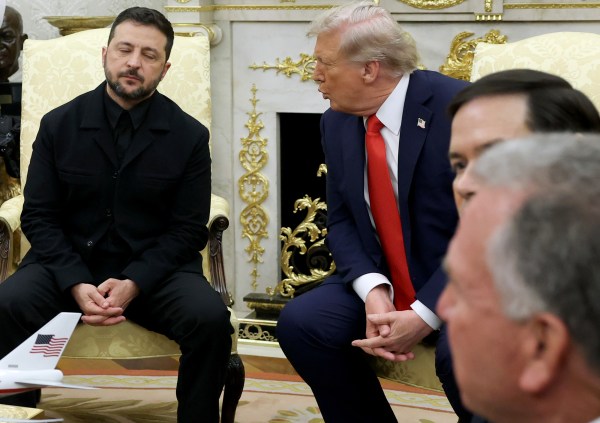[UPDATE: American officials announced Thursday that they had secured the freedom of basketball star Brittney Griner from what the State Department considered wrongful detention in Russia. Griner’s release came after a one-for-one prisoner exchange for Viktor Bout—nicknamed the “Merchant of Death”—a Russian arms dealer who was sentenced to 25 years in prison by a U.S. court in 2012. Many Americans are still behind bars in foreign countries across the world, including Russia.]
American basketball star and two-time Olympic gold medalist Brittney Griner celebrated her 32nd birthday in a Moscow prison cell last week. Unless the U.S. government can strike a deal with Russia, Griner may spend eight more birthdays there—all for accidentally bringing trace amounts of cannabis oil into the country.
The high-profile case of Griner, one of nearly 60 Americans known to be either wrongfully detained by foreign governments or held hostage by terrorist groups overseas (though the number is believed to be much higher), is forcing the Biden administration to rethink strategies it’s preferred to keep quiet: hostage negotiations with foreign governments. It comes as America’s adversaries are getting wise to the power of seizing U.S. nationals as political and economic bargaining chips.
Bartering with foreign governments for unjustly detained Americans isn’t a new problem, but it is becoming a bigger one: Between 2001 and 2011, an average of five Americans per year were wrongly detained abroad, according to a recent report by the James W. Foley Legacy Foundation. Between 2012 and 2022, that number shot up to 34. Just five countries make up 75 percent of current wrongful detentions: Russia, China, Iran, Venezuela, and Syria.
Over the years, administrations have approached hostage negotiations in different ways. Some use the mutual release of detainees to kickstart improved diplomacy with hostile foreign actors. Some presidents offer economic concessions, while others argue that pay-offs incentivize more arbitrary arrests.
Iran is particularly adept at profiteering off detained foreign nationals and dual-nationals. The Obama White House’s implementation of the Iran nuclear deal in 2016 famously accompanied the release of five Americans in exchange for seven Iranian nationals and $400 million. The administration at the time claimed that the payment was to resolve an outstanding financial claim and was unrelated to the release of inmates. But officials later conceded that the cash was used as leverage in the prisoner swap.
There’s concern that the Biden White House might take a similar approach to Tehran. Iranian media reported last month that the U.S. plans to oversee the release of $7 billion in frozen funds to Iran for the freedom of what it described as “Iranian-American dual-national spies.” The status of such an agreement is unclear, however, as it may be tied up with again-stalled nuclear talks.
Iranian officials recently released Baquer Namazi—an 85-year-old Iranian-American—on medical grounds, but his son Siamak remains in Iran as the regime’s longest-held American prisoner after his arrest in 2015. Iranian authorities have detained several foreign nationals on espionage charges amid ongoing mass protests.
“The Iranian regime has been running this racket for 45 years,” Mark Dubowitz, CEO of the Foundation for Defense of Democracies, said in an interview.“The regime is happy to get paid billions of dollars, and then will do what it always does, which is just take more hostages.”
President Donald Trump prided himself on freeing Americans without cash payouts, though some reports claimed that the Trump White House paid North Korea $2 million in medical care compensation for the release of Otto Warmbier. The University of Virginia student fell into his coma after being beaten and tortured by North Korean officials, a U.S. federal court later found, and died shortly after his evacuation back to the U.S. in 2017.
Trump made bringing captive Americans home a key political priority during his time in office, which garnered both praise and scrutiny. The former president, who claimed to have secured the return of more than 50 wrongfully detained Americans, famously deemed himself the “greatest hostage negotiator” in the country’s history. While freed detainees and their families praised Trump for being hands-on, critics advised against publicly airing the sensitive deliberations for fear it might motivate new arrests.
Biden, meanwhile, has adopted a more discreet approach than his predecessor. When the administration arranged for the release of U.S. Marine Trevor Reed in exchange for Russian drug smuggler and pilot Konstantin Yaroshenko last April, officials didn’t notify Reed’s family until he was en route home. The deal had been struck months earlier, prior to Russia’s invasion of Ukraine.
Administration officials are angling for a similar agreement to free Griner and Paul Whelan—a former Marine who has been in Russian custody since 2018—but say Russian officials have grown increasingly obstinate and unresponsive. The Biden administration had previously offered to release Russian arms dealer Viktor Bout—nicknamed the “Merchant of Death”—in exchange for their safe return.
Barring a deal, Griner will serve out the remainder of her nine-year sentence in a Russian penal colony, where inmates face forced labor, torture, and sometimes even death at the hands of prison guards. Given Russian President Vladimir Putin’s use of detained foreign nationals as geopolitical pawns, her family questions whether they’ll ever see her again.
“On its face it just seems like my wife is a hostage. To know that our government and a foreign government [are] sitting down and negotiating for her release—she’s a hostage,” Griner’s wife Cherelle said in an interview this month. “It terrifies me because, I mean, when you watch movies, sometimes those situations don’t end well. Sometimes they never get the person back.”







Please note that we at The Dispatch hold ourselves, our work, and our commenters to a higher standard than other places on the internet. We welcome comments that foster genuine debate or discussion—including comments critical of us or our work—but responses that include ad hominem attacks on fellow Dispatch members or are intended to stoke fear and anger may be moderated.
With your membership, you only have the ability to comment on The Morning Dispatch articles. Consider upgrading to join the conversation everywhere.